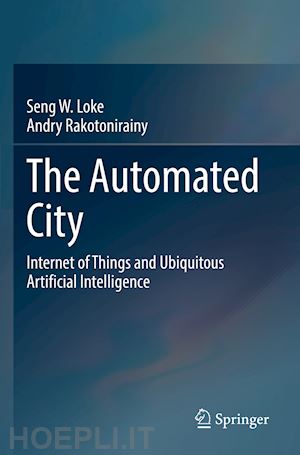1 An Overview of Technology Trends towards Smarter Cities
1.1 The Rise of Automation
1.2 The Rise of Smart Cities
1.3 Technology in Cities in the midst of a Pandemic
1.3.1 Robots Helping to Deal with Infectious Diseases
1.3.2 Delivery Robots
1.3.3 Delivery Drones
1.3.4 Drones, Robots, AI and Wireless Signals for Monitoring and Enforcement
1.3.5 Mobile App for Social Contact Tracing and Location-Based Visualizations
1.3.6 Government Health Notifications and Advice via Smartphones
1.3.7 Data Analytics for the City
1.3.8 Smart Public Transport Stations
1.3.9 Discussion
1.4 An Overview of Trends in Technology
1.4.1 Internet of Things (IoT), Ubiquitous Computing
1.4.2 Artificial Intelligence (AI) and Robotics
1.4.3 Platforms, Sharing Economy, Urban Apptivism, and City Operating Systems
1.4.4 Digital Tools for Participation, Human Coordination, and Hackable Smart Cities
1.4.5 Intelligent Transport Systems (ITS) and Automated Vehicles (AVs)
1.5 Conceptualisations of the Smart City
1.5.1 Smart City Standards
1.5.2 Three Focus Areas of Technology in Smart Cities
1.6 Towards Smarter Cities
References
2 The Automated City: Concept and Metaphors
2.1 The Automated City in Relation to Current and Emerging Technologies: Concept
2.1.1 Automation of Large Scale City Systems
2.1.2 Predictive and Proactive Cities, and the Availability of Data
2.1.3 Robots Everywhere
2.1.4 Self-Repairing Cities, Self-Organizing Cities and Self-Regenerating Cities
2.1.5 The Automated City as a “Living” Machine
2.2 The Automated City in Relation to its Inhabitants: Metaphors
2.2.1 Machines as Partners: Machines Living in Human Environments
2.2.2 Machines as Hosts: Humans Living Inside Machines
2.2.3 Machines as Art: Machines as Expressions of Human Living
2.2.4 The Humane Automated City
2.3 The Automated City: a Working Definition
References
3 Automated Vehicles, Urban Robots and Drones: Three Elements of the Automated City
3.1 Introduction
3.2 Automated Vehicles (AVs)
3.2.1 The Potential of Automated Vehicles
3.2.2 Issues and Limitations
3.2.3 Summary on Automated Vehicles
3.3 Urban Robots
3.3.1 The Potential of Urban Robots
3.3.2 Issues and Limitations
3.3.3 Summary on Urban Robots
3.4 Urban Drones
3.4.1 The Potential of Urban Drones
3.4.2 Issues and Limitations
3.4.3 Summary on Urban Drones
3.5 Summary of Chapter
References
4 The Future of the Automated City: Social, Technical and Ethical Perspectives
4.1 Visions of Future Cities
4.1.1 The Walkable City and Urban Hubs
4.1.2 Trees, Energy, the Green City and Sustainability
4.1.3 Other Visions of the Future City
4.1.4 Impacts of Technology on Citizens and Workforce - What Do We Want City Inhabitants to Become?
4.1.5 Which Vision?
4.1.6 The Evolution of Cities: Bottom-Up or Top-Down?
4.2 Governance
4.2.1 Policies
4.2.2 Governance by Algorithms
4.3 New Business Models
4.4 Urban Transportation
4.5 Real-Time Tracking
4.6 Urban Edge Computing
4.7 Blockchain for Smart Cities
4.8 Massive Cooperation
4.8.1 Platforms for Massive Cooperation
4.8.2 Cooperative Intelligent Transport Systems (Coop-ITS)
4.8.3 Cooperative Vehicles and Applications
4.8.4 Cooperative-By-Design
4.8.5 Cooperative Internet of Things
4.9 Trust and Ethics in AI and the Automated City
4.9.1 Trusting Machines
4.9.2 Can AI and the Automated City be Dangerous?
4.9.3 Ethical Algorithms in the Automated City
4.9.4 Ethical Algorithmic Behaviour for Smart Connected Things
4.10 Summary of Chapter
References
5 Conclusion
5.1 The City in Physical Space and in Cyber Space
5.2 What Use Will the Automated City Have? Reflections on the Post-Pandemic City
5.3 Its Not All About the Technology
References
Index











